News from the Editor's Desk - June-July 2017
Calibre Essay Prize
The Calibre Essay Prize, now in its eleventh year, has played a major role in the resurgence of the literary essay. This year we received almost 200 essays from fourteen countries. ABR Editor Peter Rose – who judged the Prize with Sheila Fitzpatrick (award-winning historian and ABR and LRB regular) and Geordie Williamson (Picador Publisher and editor of The Best Australian Essays 2015 and 2016) – rated this year’s Calibre shortlist the finest he has considered.
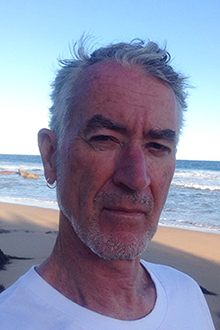 Michael AdamsMichael Adams is the winner of the 2017 Calibre Essay Prize. His essay is entitled ‘Salt Blood’. Dr Adams receives $5,000 from ABR. Readers will have an early opportunity to hear Michael Adams talk about, and read from, his essay at the Calibre ceremony, which will take place on Thursday, 1 June at the University of Wollongong, where he teaches.
Michael AdamsMichael Adams is the winner of the 2017 Calibre Essay Prize. His essay is entitled ‘Salt Blood’. Dr Adams receives $5,000 from ABR. Readers will have an early opportunity to hear Michael Adams talk about, and read from, his essay at the Calibre ceremony, which will take place on Thursday, 1 June at the University of Wollongong, where he teaches.
Michael Adams told Advances: ‘Winning the Calibre Prize is an incredible honour. I have followed Calibre for many years, and drawn much inspiration and insight from previous winners. I hope my essay highlights some hard issues: I take Rebecca Solnit’s position that we write the stories that we can’t tell anyone.’
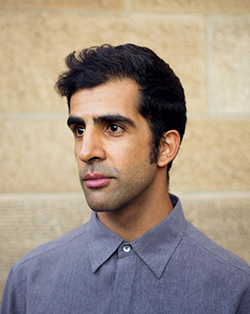 Darius Sepehri (photograph by Elena Carletti)This year we have added a second prize, worth $2,500. Darius Sepehri, a PhD student at the University of Sydney, is the recipient. His essay, titled ‘To Speak of Sorrow’, will appear in the August issue. He told Advances: ‘Together the Calibre essays constitute a spirited conversation in Australian writing. With other readers, I’ve followed the golden threads of themes running through them: memory, landscape, belonging, kin, loss, and presence. I am delighted to join essayists that have given us playful and provocative reflections, commanding arguments, and defences of the nobility of art and the inner life.’
Darius Sepehri (photograph by Elena Carletti)This year we have added a second prize, worth $2,500. Darius Sepehri, a PhD student at the University of Sydney, is the recipient. His essay, titled ‘To Speak of Sorrow’, will appear in the August issue. He told Advances: ‘Together the Calibre essays constitute a spirited conversation in Australian writing. With other readers, I’ve followed the golden threads of themes running through them: memory, landscape, belonging, kin, loss, and presence. I am delighted to join essayists that have given us playful and provocative reflections, commanding arguments, and defences of the nobility of art and the inner life.’
ABR is grateful to Colin Golvan QC and the ABR Patrons, who make these two prizes possible.
The judges have also commended essays by Sara Dowse (‘Making Things’) and Meng Jin (‘Change, We, Art’). These essays will appear in coming issues of ABR.
Fellowships galore
We’re delighted to announce two more ABR Fellowships, each worth $7,500.
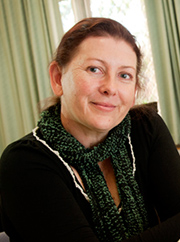 Margeurite JohnsonMarguerite Johnson is the ABR Gender Fellow. Her project is titled ‘Mapping Gender, Sexuality and the Environment: Picnic at Hanging Rock Fifty Years On.’ This year marks the fiftieth anniversary of the publication of Joan Lindsay’s novel, which was subsequently filmed by Peter Weir and recently dramatised by Tom Wright. Dr Johnson was chosen by Andrea Goldsmith, Peter Rose, and Ilana Snyder. We are grateful to Emeritus Professor Anne Edwards AO for enabling us to offer this Fellowship.
Margeurite JohnsonMarguerite Johnson is the ABR Gender Fellow. Her project is titled ‘Mapping Gender, Sexuality and the Environment: Picnic at Hanging Rock Fifty Years On.’ This year marks the fiftieth anniversary of the publication of Joan Lindsay’s novel, which was subsequently filmed by Peter Weir and recently dramatised by Tom Wright. Dr Johnson was chosen by Andrea Goldsmith, Peter Rose, and Ilana Snyder. We are grateful to Emeritus Professor Anne Edwards AO for enabling us to offer this Fellowship.
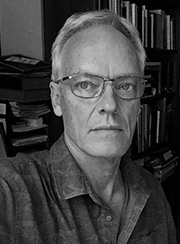 Philip JonesPhilip Jones is the 2017 ABR Patrons’ Fellow. Such was the quality of the field for the second ABR RAFT Fellowship – recently awarded to Elisabeth Holdsworth – that we have decided to fund two additional Fellowships, including this one. Philip Jones’s project is titled ‘Beyond Songlines’. He will ‘probe European attempts at defining terms such as “dreaming” and “songlines”’. This Fellowship is funded by ABR’s many Patrons.
Philip JonesPhilip Jones is the 2017 ABR Patrons’ Fellow. Such was the quality of the field for the second ABR RAFT Fellowship – recently awarded to Elisabeth Holdsworth – that we have decided to fund two additional Fellowships, including this one. Philip Jones’s project is titled ‘Beyond Songlines’. He will ‘probe European attempts at defining terms such as “dreaming” and “songlines”’. This Fellowship is funded by ABR’s many Patrons.
Straight at the hood
What’s the first feature you read in The New Yorker? (Tweet us, as they automatically say on Radio National.) For Advances, ‘Bar Tab’ notwithstanding, it’s Anthony Lane’s fortnightly film review. Lane, who has been writing for the magazine since 1993, is wise, witty, and often withering. (Remember his line about one forgettability starring Rain Phoenix: ‘Rain, Rain, go away.’) In the April 24 issue Lane reviewed Terence Davies’ new film, A Quiet Passion, with Cynthia Nixon as Emily Dickinson. Lane applied Dickinson’s technique in his facing review of F. Gary Gray’s film The Fate of the Furious. Here’s the first stanza: ‘Because I could not stop for Vin – / He would not stop for me – / But drove his Dodge straight at the hood / Of my – Infiniti –’.
Advances saw A Quiet Passion last year, during the British Film Festival, just before the ABR US tour, which took us to Amherst, Massachusetts. We thought of Cynthia Nixon’s remarkable performance as we stepped, a little abashedly, into the upstairs bedroom where Dickinson wrote all of those invincible poems.
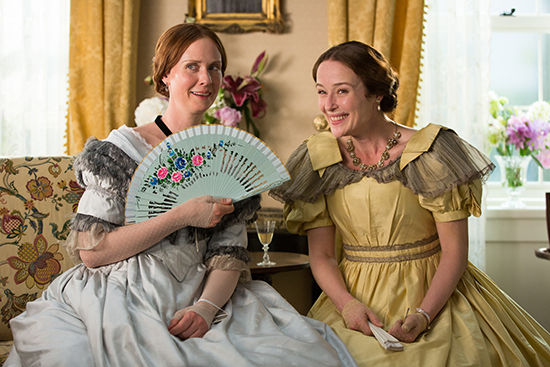 Cynthia Nixon and Jennifer Ehle in A Quiet Passion
Cynthia Nixon and Jennifer Ehle in A Quiet Passion
(image courtesy of Palace Films)
Apropos of which, Dickinsonians should not be without Cristanne Miller’s fine new edition Emily Dickinson’s Poems: As she preserved them (Belknap Press [Footprint]), $99.99 hb, 855 pp, 9780674737969). This is the first edition of Dickinson’s work to distinguish the 1,000 or so poems that she chose to copy onto folded sheets from the many that survive only on envelopes or scraps of paper.
Anwen Crawford will review A Quiet Passion for ABR Arts. (The film is released here on June 15.)
Red Room Poetry Fellowship
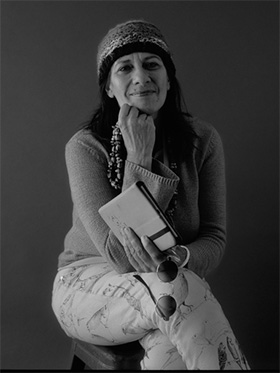 Ali Cobby EckermannAli Cobby Eckermann, winner of the 2017 Windham–Campbell Literary Prize, has been awarded the inaugural Red Room Poetry Fellowship.
Ali Cobby EckermannAli Cobby Eckermann, winner of the 2017 Windham–Campbell Literary Prize, has been awarded the inaugural Red Room Poetry Fellowship.
Eckermann will receive a ‘no-strings’ stipend of $5,000, ‘a residency at the Bundanon Trust’, the opportunity to deliver a number of paid workshops, and ‘present a public address during the year-long Fellowship’.
‘I’m at that time in my career where actual writing time is essential and I’m grateful for the opportunities this residency will bring’, said Eckermann, who was selected from ‘a formidable pool of Australian poets’, which included Kent McCarter, Elizabeth Allen, and Stuart Cooke. In a generous move, Red Room will also award commissions to the other nine shortlisted poets, due to the high calibre of submissions received.
Arts journalism
Much dismay has been expressed at the contraction of resources devoted to arts criticism by Fairfax Media. Overseas, we know, many newspapers have dropped arts reviews altogether. Elsewhere, reviews have shrunk to a paltry 100 or 200 words. It’s one reason why ABR has opted to expand its repertoire to include reviews of film, theatre, music, dance, art exhibitions, and more. We now import more of these reviews from the website, where they appear open-access thanks to support from The Ian Potter Foundation.
ABR Arts is now a core part of this enterprise, and we are actively looking for arts journalists around Australia. Our contributors are all paid properly and closely edited. We also give them due space to mount intelligent arguments, not just breathless précis.
Jolley at the EWF
ABR is pleased to be taking part in the Emerging Writers’ Festival (14 to 23 June). The Festival features a number of special events aimed at new and emerging writers including sessions and masterclasses for those interested in programming, screenwriting, pitching work to publishers, and digital self promotion. To celebrate the twenty-fifth anniversary of Melina Marchetta’s Looking For Alibrandi, the EWF is even hosting its own high school formal on Saturday June 17.
Two of the 2017 Jolley Prize judges will appear in panels on 20 June during a day-long masterclass on the short story. Ellen van Neerven will appear on a panel about editing short fiction, and ABR Deputy Editor Amy Baillieu will discuss short story competitions with 2014 Jolley Prize winner and author Jennifer Down, and David Tenenbaum and Pia Gaardboe from Melbourne Books. Visit the Emerging Writers Festival website for more information and ticketing details.
Meanwhile, our three judges (Chris Flynn is the third) are deciding this year’s Jolley Prize (worth a total of $12,500). The three shortlisted stories will appear in our August Fiction issue, and the winner will be revealed at a special ceremony in Sydney later that month.
SMH Best Young Australian Novelists
ABR was delighted to see two recent Jolley Prize winners among the four novelists selected by The Sydney Morning Herald as this year’s Best Young Australian Novelists. Congratulations to all four authors – Jennifer Down, author of Our Magic Hour (reviewed here by Gretchen Shirm) and 2014 Jolley Prize winner for ‘Aokigahara’; Josephine Rowe, author of A Loving, Faithful Animal (reviewed here by Kate Holden) and 2016 Jolley Prize winner for ‘Glisk’); Julie Koh, author of Portable Curiosities (reviewed here by Cassandra Atherton); and Rajith Savanadasa, author of Ruins (reviewed here by Claudia Hyles)!
Calling young science writers!
The UNSW Bragg Student Prize for Science Writing is now open to students across Australia in Years Seven to Ten. This year’s essay topic is ‘Future Earth: Creating a more sustainable planet by 2030’. Students will have up to 800 words to discuss ‘challenges in developing sustainable energy, managing food sources, clean water, waste, and protecting biodiversity.’
The winner will be awarded a $500 voucher to UNSW Bookshop and a subscription to Australian Book Review. The essay will be published in CSIRO’s Double Helix magazine, Cosmos Magazine’s online blog, CareerswithSTEM.com, and the NewSouth website. Entries close 20 August, 2017.
The Prize is supported by UNSW Press and UNSW Science. For guidelines and more information, visit the Prize website.






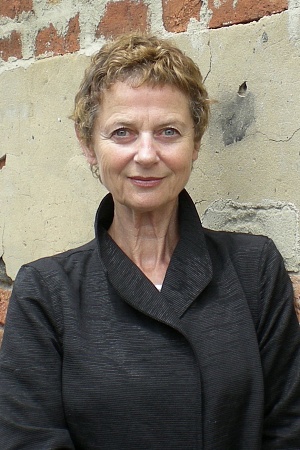




Leave a comment
If you are an ABR subscriber, you will need to sign in to post a comment.
If you have forgotten your sign in details, or if you receive an error message when trying to submit your comment, please email your comment (and the name of the article to which it relates) to ABR Comments. We will review your comment and, subject to approval, we will post it under your name.
Please note that all comments must be approved by ABR and comply with our Terms & Conditions.